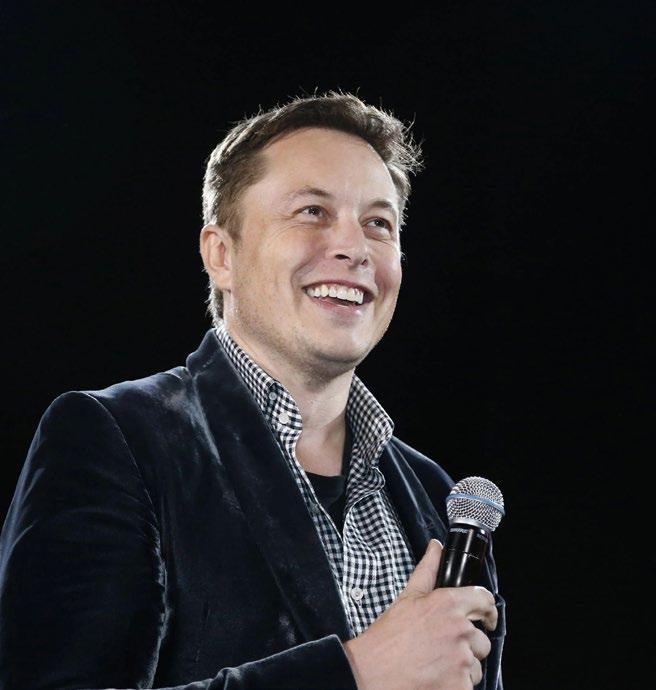
2 minute read
Elon Musk
As a world-renowned figure, Elon Musk has become something of an icon representing the finest of innovation in our era. Clearly inspired by an iconic figure of the prior century given he named his electric car brand ‘Tesla’ (after the electrical engineering genius Nicola Tesla) he represents a tradition of disruption and creativity that has the power to launch our civilisation forward.
In fact, Tesla has become so successful, it’s now in the process of supplanting German auto-giant BMW, a quite unbelievable feat given BMW is well over one hundred years old with an excellent global reputation. Telsa was launched almost 100 years after BMW, yet its growth has been rooted in two key trends that allow it to speak to modern demands. Firstly, Tesla’s all-electric fleet speaks to the desire of modern consumers to be green and sustainable.
Advertisement
Musk recently said:
“It’s now clear that people want electric cars. They want sustainable transport. They want clean energy. This really tends to be somewhat of an age-related attitude: The younger somebody is, the more they care about the environment. And so, as time goes by, they grow older, and then they become the decision-makers. That’s the normal way of the world.”
Yet Musk has created such success because of the second key trend – style. Where many sustainable innovations have struggled, Tesla has succeeded as Musk has made Tesla vehicles green and clean, but also trendy, practical and of high performance.
There’s a lesson in here for anyone involved in sustainability –that modern consumers want to go green, but they also want to abide along with a certain quality of life, they want a brand which speaks to their values and aspirations, which Tesla has masterfully done.
Musk’s approach is also inherently refreshing as he doesn’t so much see his competitors as competition (ironically) but players in the same field that can be utilised in the pursuit of a common goal.
He recently stated: “Our approach is probably going to be to execute independently. But we can either manufacture or license some of our technology to companies like BMW.
“We’re trying to be as pure as possible here with respect to our goal, which is to accelerate the advent of sustainable energy.
“So, it’s not about creating competitive walled gardens or anything like that. We’re going to be making our Supercharger network available to other companies; we’re going to offer licensing of Autopilot.
“They want to use our autonomy. And we can potentially do something with battery cells. And, you know, we’re willing to license technology to help other companies do the right thing.”
As a global business (and cultural) figure, Musk has made such waves because he genuinely believes in building a sustainable future. We’ve all heard our fair share of corporate cliches regarding sustainability, yet when Musk speaks about his operations, there’s
an authenticity that rings true:
“We actually publish a sort of sustainability report. We insist, for all of our suppliers, that the materials are ethically sourced. And this is verified with the party organisations. So, I’m highly confident that no child labour is being used for any of our mining operations. If there is, and somebody can point that out, we will take immediate action. Besides that, cobalt is a very important economic resource for the Congo. People are really counting on this money.”
This is seconded by the fact that Musk has also recently sold his ‘main home’ and got rid of many of his possessions as they, in his words, ‘weigh you down’. Again, this shows an attitude of a man committed to general wellbeing over wealth and status.










